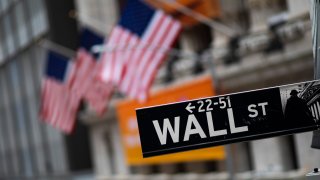
Asian markets were mostly lower on Wednesday as investors kept a wary eye on how the coronavirus pandemic will affect the economic outlook.
Stocks slipped Wednesday in Japan, Hong Kong and Seoul but rose in Sydney after the government reported retail sales fared better than expected.
Overnight, the S&P 500 gained 1.1%, ending a four-day losing streak amid a raft of worries about the pandemic and how governments are responding to it.
The head of the Federal Reserve, Jerome Powell, is pressing Congress for more aid to support the economy’s recovery, citing worries over the lingering impact of the pandemic.
Get Connecticut local news, weather forecasts and entertainment stories to your inbox. Sign up for NBC Connecticut newsletters.
“In fact, even as Fed Powell has sounded caution about the strength and steadiness of a recovery — contingent on ‘keeping the virus under control' — the wider Fed positioning is not one of unbridled pipeline stimulus. And this may limit follow-through rallies in asset markets," Mizuho Bank said in a commentary.
Tokyo's Nikkei 225 fell 0.6% to 23,220.33, reopening after a four-day weekend, while the Hang Seng in Hong Kong edged 0.1% lower, to 23,700.69. South Korea's Kospi sank 0.8% to 2,313.86. Shares fell in Thailand, Singapore and Taiwan but rose in Jakarta.
The Shanghai Composite index inched up 0.1% to 3,275.87. Australia's S&P/ASX 200 jumped 1.5% to 5,871.90 after the government said retail sales fell 4.2% from the month before in August, much less than the 11% forecast, Marcel Thieliant of Capital Economics said in a commentary.
Business
That was despite a renewal of lockdowns to battle coronavirus outbreaks in Melbourne and its surrounding Victoria state.
“The resilience of sales in Victoria underlines that people’s behavior is a more important driver of consumption trends than government restrictions," Thieliant said.
Overnight, stocks on Wall Street shrugged off an early slide, halting their first four-day losing streak since the market was selling off in the early days of the pandemic.
The S&P 500 climbed 1.1% to 3,315.57, led by solid gains in technology and communications stocks, and companies that rely on consumer spending. Banks, health care and energy stocks closed lower.
The gains helped the market recover some of its losses a day after stocks tumbled amid a raft of worries about the pandemic and governments’ response to it.
The Dow Jones Industrial Average gained 0.5% to 27,288.18. The Nasdaq composite climbed 1.7% to 10,963.64 and the Russell 2000 index of small company stocks picked up 0.8%, to 1,496.96.
Wall Street has lost momentum following months of powerful gains that brought fresh record highs. The benchmark S&P 500 index is down 5.3% so far this month, while the Nasdaq is off nearly 7%. A long list of concerns for investors has caused big swings in the market, from worries that stocks have grown too expensive to frustration about Congress’ refusal so far to deliver more aid to the struggling economy.
The Federal Reserve chair pressed Congress to act on additional aid for the economy during a House of Representatives committee hearing Tuesday, saying that the economy appears to be improving, but still likely needs more government stimulus. Extra weekly unemployment benefits and other stimulus that Congress approved in March have expired, and some areas of the economy have already slowed as a result.
Among other concerns for investors are rising tensions between the United States and China, which could lead to a Chinese retaliation against U.S tech companies, as well as the upcoming U.S. elections and all the changes in tax policy and regulations they can create.
Tech stocks added to their gains Tuesday after a late-afternoon turnaround a day earlier. Apple gained 1.6% while Microsoft rose 2.4%. Amazon climbed 5.7%.
Traders also bid up shares in homebuilders after the National Association of Realtors said that sales of previously occupied U.S. homes rose 2.4% in August to their highest level since 2006. Sales are up 10.5% from a year ago and back to pre-COVID-19 levels of early 2020.
Among the biggest gainers was builder D.R. Horton, which rose 4.7%.
Treasury yields have dipped, and the 10-year yield was steady at 0.67%.
U.S. benchmark crude gave up 38 cents to $39.42 per barrel in electronic trading on the New York Mercantile Exchange. It rose 26 cents to $39.80 per barrel on Tuesday. Brent crude slipped 37 cents to $41.35 per barrel.
The U.S. dollar rose to 105.08 Japanese yen from 104.93 yen late Tuesday. The euro weakened to $1.1686 from $1.1710.
___
AP Business writers Alex Veiga, Damian Troise and Stan Choe contributed.



